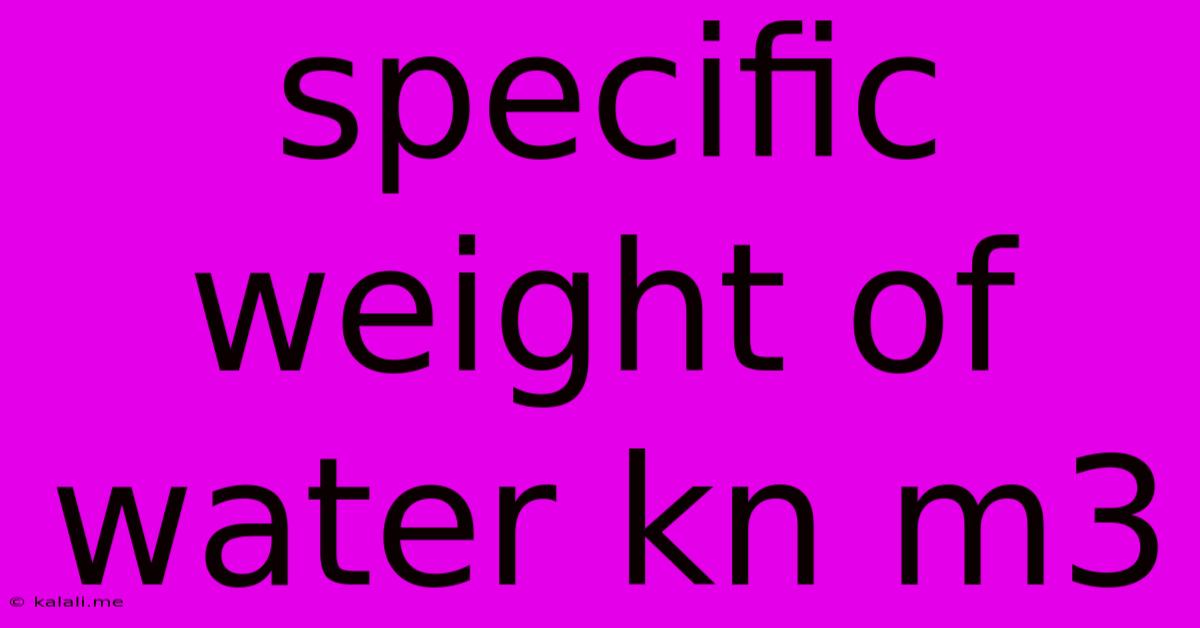Specific Weight Of Water Kn M3
Kalali
Jun 14, 2025 · 3 min read

Table of Contents
The Specific Weight of Water: A Deep Dive into Density and its Applications
Understanding the specific weight of water is crucial in numerous fields, from engineering and physics to environmental science and even everyday life. This article will delve into what specific weight is, explain its value for water, explore the factors influencing it, and highlight its practical applications. We'll also touch upon related concepts like density and specific gravity to provide a comprehensive understanding.
What is Specific Weight?
Specific weight, also known as unit weight, is the weight per unit volume of a substance. It's expressed in units of force per unit volume, typically Newtons per cubic meter (N/m³) or pounds per cubic foot (lb/ft³). Unlike density, which measures mass per unit volume (kg/m³ or g/cm³), specific weight considers the force of gravity acting on that mass. Therefore, specific weight is dependent on both the density of the substance and the acceleration due to gravity.
Specific Weight of Water (at Standard Conditions):
Under standard conditions (temperature of 4°C or 39.2°F and atmospheric pressure of 1 atmosphere), the specific weight of water is approximately 9810 N/m³ or 62.4 lb/ft³. This value is derived from the density of water at these conditions (approximately 1000 kg/m³) and the standard acceleration due to gravity (approximately 9.81 m/s²). The formula used is:
Specific Weight (γ) = Density (ρ) × Acceleration due to Gravity (g)
Factors Affecting the Specific Weight of Water:
Several factors can influence the specific weight of water, resulting in slight variations from the standard value:
-
Temperature: Water density, and thus its specific weight, changes with temperature. It reaches its maximum density at 4°C, decreasing slightly above and below this temperature.
-
Pressure: Increased pressure compresses water, slightly increasing its density and specific weight. This effect is more significant at high pressures.
-
Salinity: The presence of dissolved salts in seawater increases its density and specific weight compared to freshwater.
-
Altitude: The acceleration due to gravity decreases with altitude, resulting in a lower specific weight at higher elevations. This effect is relatively small for most practical applications.
Applications of Specific Weight of Water:
The specific weight of water is fundamental in numerous applications:
-
Hydrostatic Pressure Calculations: In fluid mechanics, specific weight is crucial for calculating hydrostatic pressure at a given depth in a water column. This is essential in designing dams, underwater structures, and pipelines.
-
Buoyancy Calculations: Archimedes' principle utilizes specific weight to determine the buoyant force acting on submerged objects. This is important in naval architecture, designing floating structures, and understanding the behavior of objects in water.
-
Irrigation and Drainage Design: Understanding the specific weight of water is essential in designing irrigation systems and drainage networks.
-
Environmental Engineering: Specific weight is used in calculating water flow rates in rivers and streams, and in evaluating water quality parameters.
Specific Gravity vs. Specific Weight:
It’s important to differentiate specific weight from specific gravity. Specific gravity is the ratio of the density of a substance to the density of a reference substance (usually water). It’s a dimensionless quantity, while specific weight has units of force per unit volume.
In conclusion, understanding the specific weight of water and the factors that influence it is essential across a wide range of scientific and engineering disciplines. The approximate value of 9810 N/m³ under standard conditions serves as a crucial benchmark for various calculations and analyses. However, remember to consider the variations caused by temperature, pressure, and salinity for more accurate results in specific applications.
Latest Posts
Latest Posts
-
How Many Valence Electrons Do Semiconductors Have
Jun 15, 2025
-
All Of The Following Are Examples Of Video Conferencing Systems Except
Jun 15, 2025
-
Lcm Of 7 4 And 3
Jun 15, 2025
-
Gpa Requirements For Stony Brook University
Jun 15, 2025
-
Which Of Daltons Postulates Were Incorrect
Jun 15, 2025
Related Post
Thank you for visiting our website which covers about Specific Weight Of Water Kn M3 . We hope the information provided has been useful to you. Feel free to contact us if you have any questions or need further assistance. See you next time and don't miss to bookmark.